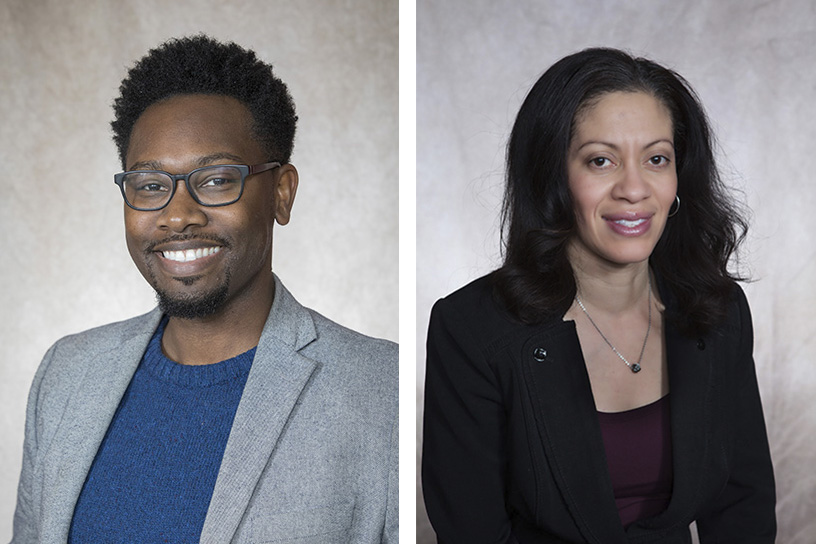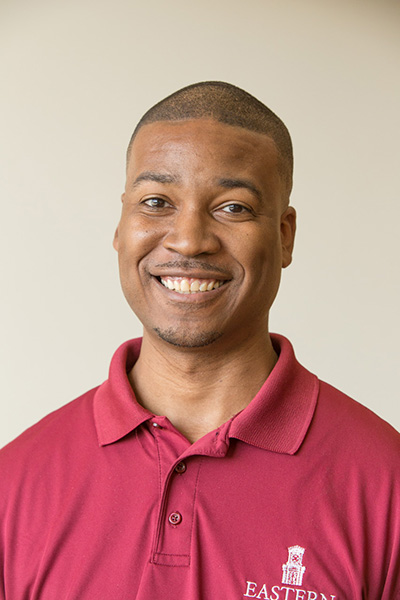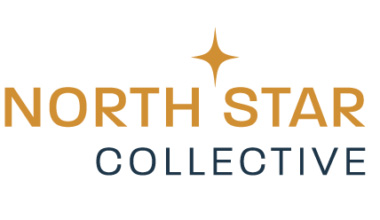- Apply
- Visit
- Request Info
- Give



Published on January 26, 2022

Eastern Connecticut State University is one of 13 founding institutions of a new reparative justice effort by the New England Board of Higher Education (NEBHE). The North Star Collective comprises a series of initiatives to support Black, Indigenous and People of Color (BIPOC) faculty. The first such initiative is the North Star Collective Faculty Fellowship, which benefits junior faculty of color through their writing and publication endeavors — activities that are critical for achieving promotion and tenure.
Theatre Professor DeRon Williams and Social Work Professor Isabel Logan were selected from Eastern for the fellowship’s inaugural cohort this spring semester. Up to 25 faculty from the collective’s 13 founding institutions are participating in the fellowship, which includes a mentored writing retreat, workshops, writing groups, a $1,000 grant for each fellow and more.
“Eastern has become known for its efforts to diversify its faculty, being that we have one of the highest percentages of faculty of color for all institutions in Connecticut,” said LaMar Coleman, vice president for equity and diversity, of NEBHE’s recommendation to involve Eastern in the North Star Collective.

“Faculty of color face a unique set of challenges,” explained Coleman. “In addition to potentially feeling marginalized within society as a whole, those feelings can spill over into the academic setting where they may feel that they have to work 10 times harder to prove their competence and scholarly abilities. While faculty of color are already in the minority, those who are able to achieve tenure and promotion are even smaller in number. Therefore, any supportive programs that can assist junior faculty of color to prepare for and achieve tenure and promotion are very beneficial.”
Williams joined the Eastern faculty in fall 2018 with academic interests in African American theatre and gender/sexuality in performance. As a doctoral student at Albany State University, a small, historically Black college/university (HBCU) in Georgia, Williams said he “established an affinity for exploring African American performance and a passion for directing pedagogy and practice. This affinity grew into a personal and professional obligation to foster the development and exploration of works from minority artists, especially Black artists.”
Williams will focus his fellowship on the development of several writing projects. First, he is co-editing a collection of essays titled “Contemporary Black Theatre & Performance: Acts of Rebellion, Activism, and Solidarity.” Williams explained, “The book contemplates how contemporary artists, activists and pedagogues push the boundaries of Black cultural performances and subsequently work at the nexus of rebellion, activism and solidarity for liberation.”
His second book project is titled “Staging Perspectives: The Politics of Race and Gender on the American Stage” and “investigates the systemic structures that act as a barrier to the growth and progression of traditionally marginalized artists.” Williams is also a contributing author to the pending “August Wilson in Context” anthology, in which he will reflect on the directing approaches of Wilson’s plays and “contemplate (their) enduring impact in the 21st century.”
Williams will use the fellowship for editing and transcription services, as well as networking opportunities.
Logan joined Eastern in fall 2016 with academic interests in workplace microaggressions and police social work. Before entering academia, she worked as a social worker in criminal and juvenile courts for 20 years with the Connecticut Division of Public Defender Services. After experiencing microaggressions as a bilingual Latina social worker, Logan began researching the challenges faced by bilingual professionals, ultimately leading to policy implementations that protect bilingual professionals in the state’s judicial branch.
 “My journey has always been rooted in equity and social justice issues,” said Logan, “yet it was not until after the murder of George Floyd by a police officer that I began to build the foundation of my research trajectory.” Following the Connecticut General Assembly’s passing of “An Act Concerning Police Accountability” in July 2020, Logan partnered with the Willimantic Police Department to develop a novel internship program in police social work.
“My journey has always been rooted in equity and social justice issues,” said Logan, “yet it was not until after the murder of George Floyd by a police officer that I began to build the foundation of my research trajectory.” Following the Connecticut General Assembly’s passing of “An Act Concerning Police Accountability” in July 2020, Logan partnered with the Willimantic Police Department to develop a novel internship program in police social work.
The internship has expanded into the Social Work and Law Enforcement (SWLE) Project, which trains students from several institutions to work in police departments across the state — a groundbreaking program that is among the first of its kind in the country. “In essence, I created my own area of research,” said Logan. “I look forward to advancing the field of police social work in a way that produces evidence-based practice and reduces racial and ethnic disparities in the justice system.”
Logan plans to use the fellowship to continue her contributions to the discourse of this emerging field as well as connect with other bilingual faculty of color on issues surrounding her research topics.
Speaking to Eastern’s founding status in NEBHE’s North Star Collective, Vice President Coleman added, “(This) is a testament that (Eastern) is not only interested in recruiting a diverse faculty, but we also want to support them once they are here. Giving faculty of color the opportunity to apply for and participate in NEBHE’s North Star Collective is just one of the many ways Eastern strives to make sure faculty have the support they need to be successful.”
In addition to Eastern, the North Star Collective’s other founding institutions include Bridgewater State University, Clark University, Endicott College, Framingham State University, Goodwin University, Rhode Island College, Roger Williams University, Salem University, Simmons University, University of Bridgeport, University of Massachusetts-Boston and University of Southern Maine.
Written by Michael Rouleau